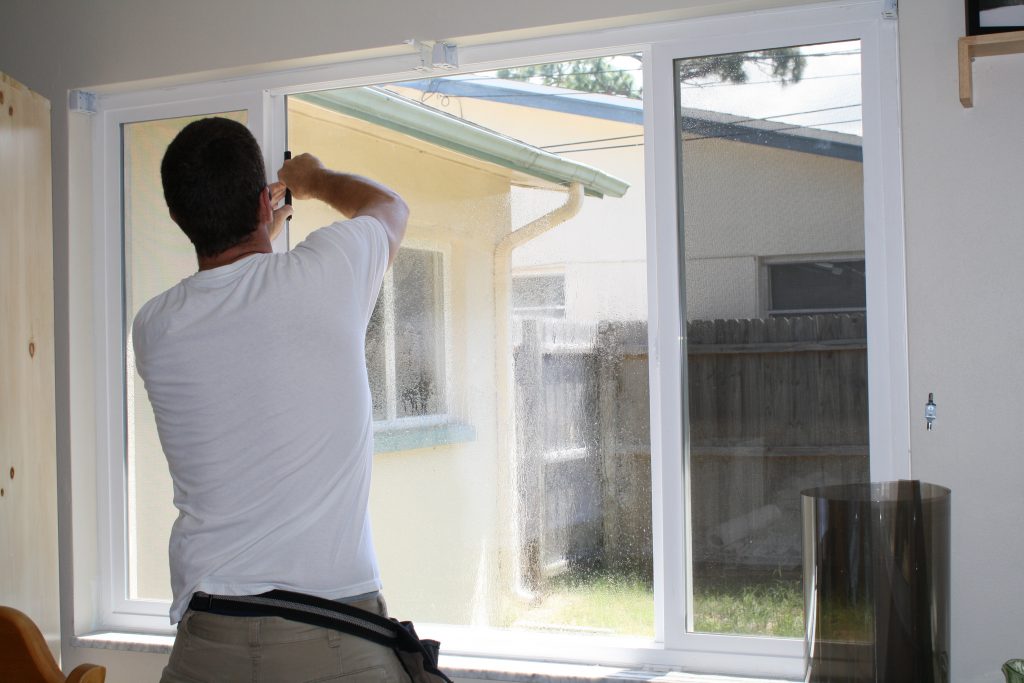Residential window tinting is a popular way to increase the functionality and looks of your home. It involves applying a thin film to the interior side of your windows, offering benefits like increased privacy, reduced glare, and improved energy efficiency. But some of our clients wonder: can window tint damage glass?
There are various types of window film available, each designed for specific purposes such as UV protection, heat reduction, and security enhancement. Professional window film can significantly improve the comfort and appearance of your home, but it’s essential to understand the installation process and potential issues to ensure the best results.
The Installation Process
Window film installation requires precision and expertise to avoid common problems. The process starts with cleaning the window surface thoroughly to remove any dust, dirt, or grease that could interfere with the adhesion of the film. Once clean, the window film is cut to the exact size of the glass. Then, the film is applied using a special adhesive that ensures a secure bond between the film and the glass.
This step is crucial because any air bubbles or wrinkles can affect the film’s appearance and performance. Finally, the edges are trimmed, and the film is smoothed out to create a flawless finish. Professionals who install window film are skilled in this process, ensuring optimal results and minimizing the risk of window film damage.
Possible Issues with Window Tint Film on Home Windows
While window tinting offers numerous benefits, there are potential issues to be aware of. One concern is window film damage, which can occur if the film is not applied correctly. Poor installation can lead to air bubbles, wrinkles, and peeling, reducing the film’s effectiveness and aesthetics.
Another issue is glass damage, especially in double-pane windows, where film application can cause the glass to overheat and crack. Some believe the window seal can be compromised if the film is applied too close to the edges, leading to seal failure and condensation between the glass panes. The truth is window tinting has no bearing on seal failure–that happens all on its own.
 How to Prevent Damage from Window Tinting
How to Prevent Damage from Window Tinting
Preventing damage from window tinting starts with choosing the right types of window film for your specific needs. It’s important to select a high-quality, professional window film that is compatible with your window type, particularly if you have double-pane windows.
Hiring a professional to install the film is also important. Professionals who install window film have the expertise to ensure proper application, reducing the risk of air bubbles, wrinkles, and improper adhesion. They also understand how to avoid placing the film too close to the window seal, which can prevent seal failure.
Regular maintenance and care are also essential in preventing window film damage. Avoid using abrasive cleaners or rough materials on the tinted windows, as these can scratch the film. Instead, use a soft cloth and a mild cleaning solution to keep the windows clean without harming the film. Regular inspections can help identify any issues early on, allowing for prompt repairs and minimizing potential damage.
Benefits of Window Tinting
Window tinting offers a range of benefits that make it a worthwhile investment for homeowners. One of the primary advantages is improved energy efficiency. By reducing the amount of heat entering your home, window tinting can lower your cooling costs during the summer and help maintain a comfortable indoor temperature. This not only saves you money but also reduces your carbon footprint.
Another benefit is increased privacy and security. Tinted windows make it harder for outsiders to see into your home, providing an added layer of privacy. Additionally, security film can strengthen your windows, making them more resistant to breakage and enhancing your home’s security.
Window tinting also protects your furnishings from UV damage. The film blocks harmful UV rays, preventing them from fading and deteriorating your furniture, carpets, and artwork. This prolongs the life of your interior decor and keeps your home looking vibrant and new.
FAQs About Window Tinting
Can window tinting damage my windows?
If not applied correctly, window tinting can cause issues such as air bubbles, wrinkles, and even glass damage, particularly in double-pane windows.
How can I prevent window film damage?
To prevent damage, choose high-quality professional window film and have it installed by an experienced professional. Regular maintenance and proper cleaning can also help.
What are the benefits of window tinting?
Window tinting offers benefits such as improved energy efficiency, increased privacy, protection from UV rays, reduced glare, and enhanced security.
Is window tinting suitable for all types of windows?
Most types of window film are suitable for a variety of windows, but it’s essential to choose the right film for your specific window type, especially for double-pane windows.
How long does window tinting last?
Professional window film can last for many years, depending on the quality of the film and the conditions it is exposed to. Regular maintenance can extend its lifespan.
If you’re considering window tinting or any other type of protective film for your home, contact Pacific Window Tinting for a free estimate. Our team of professionals can help you choose the right film for your needs and ensure a flawless installation. We are dedicated to providing high-quality service and ensuring your complete satisfaction.
Reach out to us today to learn more about how window tinting can enhance your home and protect your investment.
